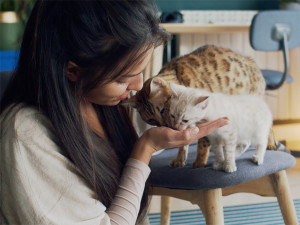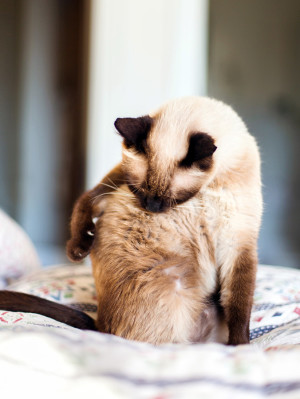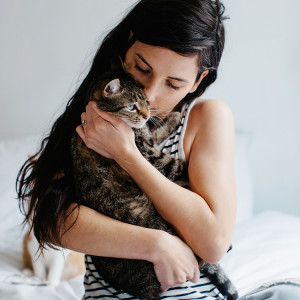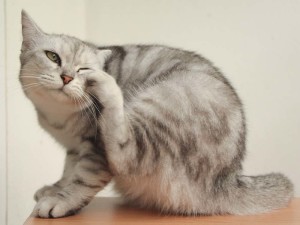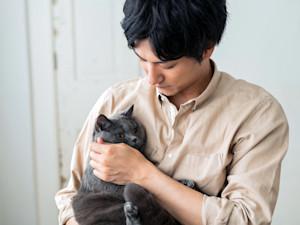Why Does Your Cat Lick Your Hair?
And should you let them?

Share Article
In This Article:
Reasons for Your Cat Licking Your Hairopens in a new tab Underlying Health Concerns for Cat Grooming Your Hairopens in a new tab Should You Let Your Cat Lick Your Hair?opens in a new tab Frequently Asked Questionsopens in a new tab
Cats do a lot with their tongues — explore and investigate, soothe others and self-soothe. They lick things that taste good and bad. That often includes us. In this case, we’re talking about cats licking our hair.

littleKin™ is Kinship’s home just for puppy and kitten parents. Bop over to check out expert advice, new pet tools, and special deals—all curated for your newest family member.
opens in a new tabReasons for your cat licking your hair
Cats may only have about 473 taste buds to our 9,000. But I think it’s safe to say they do more with their tonguesopens in a new tab than we do. We’ve looked at why cats lick our facesopens in a new tab and bodiesopens in a new tab. It’s also common for cats to lick the hair on our heads. Is there a specific reason for it? Let’s look at a few.
Affection
Cats learn almost immediately at birth that being licked is comforting. It becomes a sign of affection from their mother. That learned behavior then transfers from mom and baby to cat and any other creature they feel bonded to — cats, dogs, people. They may gravitate toward our hair because most of the other critters they lick are fur-covered. Or it could just be the proximity of our cats to our hair when they’re feeling cozy.
Grooming instincts
Licking isn’t just about affection. Cats are also groomed by their mothers at birth. That continues throughout kittenhood and, again, is transferred to other creatures, including us. Our cats may be licking our hair to clean it, especially since we use products with scent or taste they may like or want to remove.
Playfulness
Cats use their whole bodies for play — even their mouths and tongues. String is a big trigger for a lot of cats. So is movement. And many of us have a head full of “strings” that move. It’s natural for a cat to see the movement of hair and want to grab, lick, and other playful behaviors.
Attention-seeking
Cats learn quickly what to do to get what they need. That includes our attention. If your cat licks or messes with your hair and you respond in any way, they make a mental note. “If my person is just sitting there and I'm bored, licking makes something happen.”
Curiosity
Curiosity can get our cats into sticky, or hairy, situations. Smells, movement, and other things can pique a cat's interest and put them in exploration mode. They use all of their senses to investigate, including their tongues. If our hair is the target of that investigation, it’s only natural that they’d do some licking.
Scent-marking
One reason cats groom each other is to create a group scent. They use this to identify other cats as part of their social group. Your cat may lick your hair to mix their scent with yoursopens in a new tab, adding you to the social group.
Underlying health concerns for your cat grooming your hair
While there are plenty of behavioral and instinctual reasons cats may lick and groom us, there can also be medical reasonsopens in a new tab. If the licking starts suddenly, it’s hard to distract your cat when they’re licking your hair, or you notice other changes in your cat’s normal behavior, it’s time to chat with your veterinarian.
Pica or ingestion of hair
Eating non-food items is called picaopens in a new tab, and it needs prompt attention. There are many causes, including boredomopens in a new tab, stress, or certain medical issues. One of the big concerns with pica is internal damage. Ingesting sharp or pointed things can cause punctures. A collection of ingested material can cause a blockage. Call your vet if you know your cat has eaten something other than food. It may be time for an exam and X-ray.
Remember that your cat’s tongue is covered in tiny, backward-facing hooks. Things like string or pieces of cardboard can get caught on these hooks and worked toward the back of the throat, where they get swallowed. So, it may not be pica causing your cat to ingest non-food items if it only happens occasionally. They may enjoy chewing and licking things that unintentionally get forced into their throat. It’s still vital to talk to your vet.
Stress or anxiety-related licking
Cats will lick as a way of self-soothing during mild stress. It can be calming. But it can also be more of a compulsive behavior to deal with more intense stress and anxiety. If your cat seems generally nervous, can't be easily distracted when licking your hair, or seems desperate to start licking, they could have anxiety that needs attention.
Dietary deficiencies
If your cat lacks certain nutrients from, for example, an unbalanced diet or medical issues, they may lick or eat non-food items like your hair. Again, if the behavior seems obsessive or you notice other changes in your cat’s normal behavior or routine, it’s time to talk to your vet. They can do tests to check for a deficiency.
Should you let your cat lick your hair?
To be safe, it’s probably best to discourage your cat from licking your hair. You could use hair products that are unsafe for your cat to ingest, like gels or sprays. If your cat does ingest your longer hair, it could be harder for their system to process and pass due to the length. And it’s possible there’s a stress or medical trigger that isn’t being helped by licking.
When they’re licking your hair, gently and neutrally interrupt them without making a big fuss. You don’t want licking to be a way your cat gets attention. Wait a minute or two. Then, redirect them to an activity to burn off that energy. And try to provide more play and enrichment at other times so they’re less likely to lick in the first place.
These steps can help regardless of the cause. But you may need to go further if there’s a medical or stress trigger for the licking.
How to stop your cat licking your hair if it’s medical
Cats are really good at hiding medical issues. The most common clues we get are changes in their normal behavior. Things like eating, drinking, and sleeping changes, more reactivity, not playing as much, house soiling, etc., can be indicators that something is going on. If you notice anything like this, along with the licking, give your vet a call.
How to stop your cat licking your hair if it’s emotional
If the licking is a stress behavior, you may still notice some of the same changes above. And you still want to talk to your vet to rule out medical causes. Then, you can look at emotional triggers. Is there a new stressor in your cat’s life (schedule change, new pet or baby in the home, etc.)?
If so, work on reducing the impact of that trigger by removing it or lowering the intensity and helping them form positive associations with it. Do they have a medical issue that could also be causing stress? Talk to your vet about ways to manage the physical symptoms to, in turn, reduce stress. You can also reduce stress generally by doing more play, offering mental enrichment, and giving your cat a bit more attention. If you aren’t seeing an improvement, a certified feline behavior consultant can help you find possible triggers and work up a plan to address them.
FAQs
Why does my cat chew on everything?
Cats chew on things for a variety of reasonsopens in a new tab. Boredom and stress are two of the most common triggers. It can also be related to nutritional deficiencies, other medical issues, or even the taste and enjoyment they get from chewing.
Why does my cat lick my face?
The reasons your cat licks your faceopens in a new tab can be similar to why they lick your hair and chew things. Boredom, anxiety, medical issues, bonding, and more can prompt your cat to give you a lick.
Why does my cat lick me?
Cats lick for many reasons. It’s often related to getting your attention or showing you some love through grooming. It can also be the salty taste of your skin or many other reasonsopens in a new tab.
References
“Cat Behavior Tips.” Regional Animal Services of King County, kingcounty.gov/~/media/depts/regional-animal-services/files/Guides-for-pets/CatBehaviorTips_RASKC.ashx?la=enopens in a new tab. Accessed 11 Dec. 2024.
“Cats That Lick Too Much.” Cornell University College of Veterinary Medicine, 9 Oct. 2017, www.vet.cornell.edu/departments-centers-and-institutes/cornell-feline-health-center/health-information/feline-health-topics/cats-lick-too-muchopens in a new tab.
“What to Do If Your Cat Is Marking Territory.” Orange County Government, www.orangecountync.gov/DocumentCenter/View/16688/Cat-Marking-Territory.pdfopens in a new tab. Accessed 11 Dec. 2024.

LeeAnna Buis, CFTBS, FFCP
LeeAnna Buis has adored cats her entire life and thought she knew them inside-out and sideways. But it wasn’t until she worked with a feline behavior consultant that she fully understood how incredible, complicated, and inspiring cats really are.
LeeAnna earned her certification through Animal Behavior Institute, earning the CFTBS designation. She is a certified Fear Free trainer, a training professional member of the Pet Professional Guild (PPG), and a member of both the International Association of Animal Behavior Consultants (IAABC) and Cat Writer’s Association (CWA).
Related articles
![a cat licking a hot spot]() opens in a new tab
opens in a new tabHow to Spot, Treat, and Prevent Hot Spots on Your Cat
Hot spots are so not hot—your cat agrees.
- opens in a new tab
Why Does My Kitten Lick My Nose?
No complaints, but...
![dark-haired woman hugging cat that has imprinted on her]() opens in a new tab
opens in a new tab10 Signs Your Cat Has Imprinted on You
Feeling like you have a little shadow these days? Here’s why that’s happening.
- opens in a new tab
Why Does Your Cat Put Their Paw on Your Mouth?
Umm, excuse you, kitty.
![Gray and white striped cat is scratching his ear]() opens in a new tab
opens in a new tabWhat’s Up With My Cat’s Skin?
Everything you need to know about cat allergies, according to three veterinary dermatologists.
![Man holding his large gray cat.]() opens in a new tab
opens in a new tabWhy Does My Cat Have Bald Spots?
It only makes them cuter, but you may need to address the cause for this condition.

